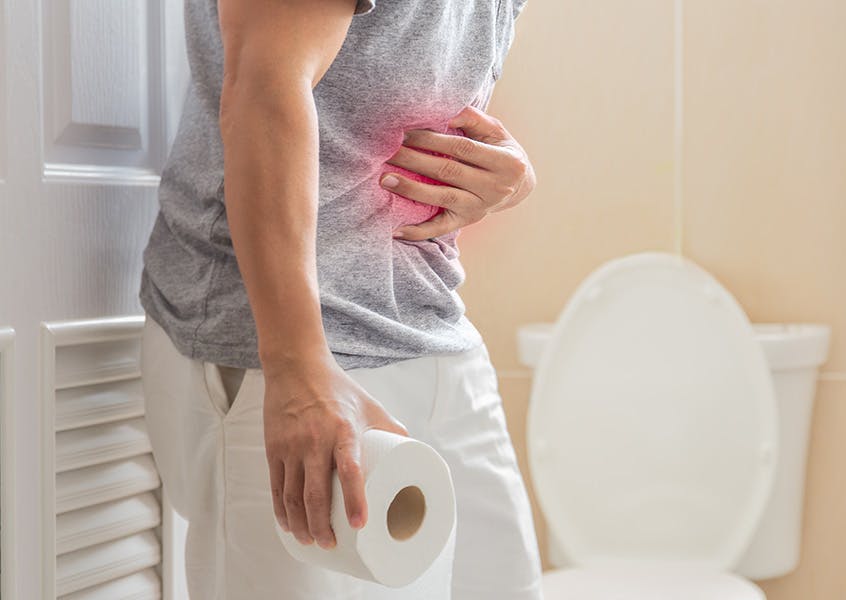Diarrhea is a common symptom that can happen to anyone, possibly caused by consuming unclean or strongly flavored food, or drinking milk. However, if you experience frequent diarrhea without a clear cause, including abdominal cramps, it may indicate a risk of developing ulcerative colitis. Today, we want everyone to pay attention to the symptoms and become familiar with ulcerative colitis.
What is Ulcerative Colitis?
Ulcerative Colitis is a condition where the lining of the large intestine becomes inflamed, leading to ulcers and bleeding along the colon wall. This results in frequent diarrhea, bloody stools, vomiting, and more. Ulcerative colitis can have long-term effects on the colon, and in severe cases, it can be life-threatening.
Factors Contributing to Ulcerative Colitis
The causes of ulcerative colitis vary, such as bacterial infections from consuming unclean food, contamination with foreign substances, infections, viruses, and parasites. Additionally, the condition may arise from abnormalities in the immune system, which mistakenly attacks the intestinal tissues, thinking they are harmful bacteria.
"Stress" as a Root Cause of Ulcerative Colitis
Stress is a significant factor that can impact us in various ways and is one of the triggers for ulcerative colitis symptoms. When stressed, our food intake decreases, leading to irregular eating habits or skipping meals. This disrupts the digestive system, affecting nutrient absorption in the small intestine and causing contractions in the large intestine.
Recognizing Symptoms of Ulcerative Colitis
If you observe the following symptoms, consult a doctor for a detailed examination:
· Unusual bowel movements such as loose stools, frequent bowel movements, blood in the stool, or a foul smell.
· Fever and chills.
· Sudden or cramping abdominal pain, including bloating and abdominal tenderness.
· Fatigue and weight loss.
· Some individuals may experience headaches or body aches.
If these symptoms are present, it's crucial to see a doctor for a thorough examination.
Treatment for Ulcerative Colitis
Treatment for ulcerative colitis depends on the severity and location of inflammation. Medications are commonly used to reduce intestinal inflammation and control symptoms. Types of medications include Aminosalicylates, Corticosteroids, and Immunomodulators. In some cases, surgery may be recommended for individuals not responding to medication, experiencing severe inflammation, or those at risk of developing colon cancer.
Easy Intestinal Care with Probiotics
Another aspect of treatment is modifying dietary habits to reduce inflammation. Consuming probiotics found in red onions, yellow beans, vegetables, and fruits, as well as probiotics in yogurt and kefir, can help alleviate inflammation symptoms. Additionally, taking Vitamin E and Vitamin C supplements can strengthen the intestines, preventing conditions like ulcerative colitis and other digestive issues. These changes can be complemented by other lifestyle adjustments, such as ensuring adequate sleep for 8 hours, regular 30-minute exercise, and reducing processed meat consumption.
You can see that frequent diarrhea is a symptom that should not be overlooked. Therefore, we should be attentive to ourselves and take care of our bodies to maintain good health. Whether it's exercising and consuming a balanced diet with all five food groups and regular meals, this alone helps to stay away from the risk of inflammatory bowel disease. For Krungthai-AXA life insurance customers interested in health care, you can read more health articles at https://www.krungthai-axa.co.th/th/health-advisories.
Refences:
· Nakornthon Hospital
· Pobpad.com
https://bit.ly/47lDTKd
https://bit.ly/3S1n2GZ
· Penn Medicine
· NSH
· Paolo Hospital
https://bit.ly/3RYq3aP
· Petcharavej Hospital


